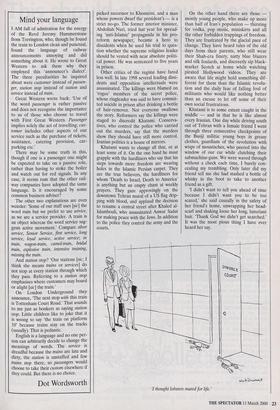Mind your language
I AM full of admiration for the energy of the Revd Jeremy Hummerstone from Torrington, who, though he found the train to London clean and punctual, found the language of railway announcements annoying and did something about it. He wrote to Great Western to ask them why they employed this 'announcer's dialect'. The three peculiarities he inquired about were customer instead of passen- ger, station stop instead of station and service instead of train.
Great Western wrote back: 'Use of the word passenger is rather passive and does not recognise the importance to us of those who choose to travel with First Great Western. Passenger implies solely the act of travelling; cus- tomer includes other aspects of our service such as the purchase of tickets, assistance, catering provision, car- parking etc.'
There may be some truth in this, though if one is a passenger one might be expected to take on a passive role, rather than having to stoke the boiler and watch out for red signals. In any case, it seems rum that the other rail- way companies have adopted the same language. Is it encouraged by some common business adviser?
The other two explanations are even weirder: `Some of our staff uses [sic] the word train but we prefer to use service, as we are a service provider. A train is an object whereas the word service sug- gests active movement.' Compare silver service, Senior Service, first service, long service, loyal service, active service; in train, wagon-train, camel-train, bridal train, explosive train, intensive training, missing the train. And station stop? 'Our stations [sic; I think she means trains or services] do not stop at every station through which they pass, Referring to a station stop emphasises where customers may board or alight [sic] the train.' On London Underground they announce, 'The next stop with this train is Tottenham Court Road.' That sounds to me just as bankers as saying station stop. Little children like to joke that it is wrong to say 'the train on platform 10' because trains stay on the tracks (usually). That is pedantic. English is a language and no one per- son can arbitrarily decide to change the meanings of words. The service is dreadful because the trains are late and dirty, the station is unstaffed and few trains stop there, so passengers would choose to take their custom elsewhere if they could. But there is no choice.
Dot Wordsworth


































































 Previous page
Previous page